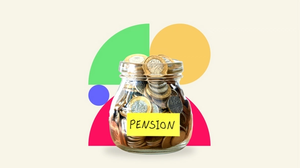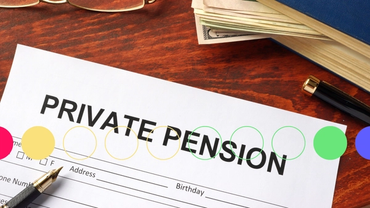Pension FAQs: Your Top 10 Questions Answered
By Boring Money
19 Sep, 2025
Pensions are complicated beasts. In fact, Boring Money research shows 64% of non-retired Brits agree that pensions are "confusing"[1], so it's no surprise that we've had tonnes of questions about them over the years! We’ve looked back through our archives as they’re stuffed full of some brilliant pension-related questions on everything from allowances to inheritance.

Scroll down and click on a question to find out the answer on everything from how much income you need in retirement to whether you can pay into a personal pension and a workplace pension in the same tax year.
A.
"How much will I need to retire?” is a question we get asked frequently, but understanding how much you personally need to save is difficult to define.
Fortunately, over the years, experts have devised various useful rules of thumb to follow to help us on our way to successful retirement planning. For example, many experts suggest that you need 70-80% of your pre-retirement income after you retire to sustain a comfortable lifestyle.
We think Pensions UK do really well to capture how much money you would need to have coming in to support your retirement lifestyle, all the way down to estimated food costs and how many holidays you want to take, based on the current cost of living.
Here's a summary of the annual income you would need for different retirement living standards in 2025:
Minimum: £13,400 for singles, £21,600 for couples
Moderate: £31,700 for singles, £43,900 for couples
Comfortable: £43,900 for singles, £60,600 for couples
Of course everyone is different, but this is a nice way to get you thinking about how much you might need to have in your pot.
To understand if you're saving enough for retirement - and what you can do if you're falling behind - head over to our handy calculator for a personalised retirement income report.
A.
There are a few points to consider here.
If you're employed, it’s highly likely that you're already enrolled in your employer’s workplace pension. If you decide you want to start saving more towards your pot, it’s worthwhile asking your employer if they will match any increases to your personal contributions. This is effectively free money so it's a bit of a no-brainer!
Remember that saving any amount - no matter how small - can make a big difference over long periods of time thanks to the magic of compounding
. Not only will you receive tax relief on your contributions, you'll also benefit from potential growth from the pension itself.If you're still young, the compounding effect over many years can turn even very small, regular payments into a potentially significant amount of money. Your future self will thank you.
However, there are some limits to how much you can save into your pensions each year. This can be a little complex, but generally speaking, the maximum you can save and still receive tax relief on is the lower of either £60,000 or 100% of your earnings. If you don’t have any earnings, the maximum you can contribute and still benefit from tax relief is £2,880.
Finally, it’s also important to think about your short/medium/long-term objectives. It’s likely that you won’t be able to access your pension funds until at least age 57, so keep that in mind when you're thinking about how much to put away each month!
A.
Very few people stay in a job for life nowadays, so you're not alone in accruing a few pensions. The government are developing a pensions dashboard which will allow people to access and view all their pensions in one place, but that is still a few years away.
In the meantime, if you're looking to simplify your pensions, pension consolidation is your main option. But it's important to consider both the benefits and drawbacks.
One potential drawback of consolidating any pension is the loss of safeguarded benefits. Some pensions, namely Defined Benefit/Final Salary
schemes, have additional benefits such as guaranteed incomes. These benefits can be extremely valuable, and you should never surrender them without seeking professional financial advice first.If you do still want to consolidate, you may be able to transfer your older pots into your current workplace pension scheme. It’s worth noting that pension providers are not allowed to transfer plans that are valued at over £30,000 and have safeguarded benefits without you taking financial advice first, so there is a safety net.
Alternatively, you can just leave them where they are. Once you leave employment and are no longer contributing to the pension, the plan becomes what is known as 'paid-up'. All that means is that there are no further contributions being paid. It doesn’t stop you 'interacting' with the pension, and this means you can still manage and change the underlying
investment funds or change the level of risk you are taking. The funds' value will hopefully continue to grow over the medium to long-term until you cash in.The other thing you should consider is cost. All pension plans have what is known as an 'AMC' (annual management charge). These costs can have a major impact on your returns, so it’s important that you don’t transfer to a more expensive plan without a good reason. Check out our shortlist of the best pension providers on the market to browse fees, investment choice, customer reviews and more.
A.
It's increasingly common to have multiple pensions from previous jobs. It’s therefore also easy to lose track! The good news is that finding them isn’t too tricky, and getting everything in one place can help you see the bigger picture.
Start by making a list of your past jobs and checking whether you had a pension with each employer. If you’re not sure:
Ask your old employers – Their HR or payroll teams should be able to point you in the right direction.
Use the Pension Tracing Service – A free government tool that can help you track down pension providers linked to your past employers. You’ll just need to enter the company name. Find it here.
Once you’ve got the names of your old pension providers, you'll need to do the legwork yourself to get in touch and ask them for:
Your current pension balance
How your money’s being invested
Any special benefits or fees attached
If you’re struggling to get answers, the government's MoneyHelper service has loads of useful advice. You can contact them Monday-Friday if you want to chat to a real person with the following:
Telephone: 0800 011 3797 (Monday to Friday, 9am to 5pm. Closed on bank holidays).
A.
First of all, in order to access your workplace or personal pension funds, you need to be aged 55 or over (increasing to age 57 from 2028 for all plans set up after 12 February 2021). Separately, you currently need to be at least 66 to access your State Pension.
There are a number of methods of taking money from a pension and which one you choose can impact how quickly you will receive your funds. Here are the main ways you can access your retirement savings:
Tax-free lump sum - All UK adults have the right to withdraw a lump sum worth up to 25% of the total value of your pension (capped at £268,275) without paying tax once you reach 55. It usually takes around two to four weeks for your funds to be released. You can read about how this works, how to do it and what you should be aware of here.
Annuity - This is where you use the value of your pension pot to buy a guaranteed annual income for life (or a pre-agreed period of time). You will typically select a specific date to start receiving your income when you purchase your policy. You can read more about how annuities work here.
Drawdown - You withdraw from your pot incrementally, while the remaining funds stay invested (and hopefully continue to grow). Remember you can take the 25% tax-free lump sum as well. How quickly you'll receive your money will differ from provider to provider, but it can take up to a month or more. You can read more about pension drawdown here.
In any case, if you're preparing for retirement, this would be the perfect time to speak to a professional financial adviser to discuss your goals and objectives. They can review your finances and advise you on the best way to draw from your pot for your specific needs.
Advisers can also help you identify the most tax-efficient way of accessing your pot, and ensure your withdrawal strategy will be sustainable throughout your retirement.
If you're over age 50, you can book an appointment for free and impartial government guidance through PensionWise. You can book an appointment if:
You’re aged 50 or over, and;
You have a UK-based defined contribution pension pot (this could be a personal or workplace pension)
This is only a short overview of the main options available to you, and we always recommend that you seek professional financial advice for further guidance and support for your unique circumstances.
A.
Yes, you can have a workplace pension at the same time as other retirement saving products, such as a personal pension and/or a Lifetime ISA (LISA). In fact, this can be a great way to save more and take control of your investments - especially if you're already making the most of your workplace scheme.
Just remember the £60,000 annual allowance, which applies to all savings in your workplace and personal pensions every year (including any tax relief). Lifetime ISAs are not counted as part of the allowance.
You'll usually get a statement from your pension provider telling you if you go above the annual allowance in their respective scheme. However, if you've got more than one pension and you're worried you've exceeded the allowance, you can ask each individual provider for statements.
HMRC has a calculator which can help you determine if you've gone above the allowance. If it turns out you have, either you or your provider must pay the liable amount. This can get quite complex so make sure to read HMRC's guide if you find yourself in this situation.
A.
Some employees have a type of pension called a "Defined Benefit" (DB) scheme. They're sometimes also called "final salary" pensions.
Many of those who work in the civil service or healthcare (e.g. the NHS) have this type of plan, which usually involves a guaranteed income for the rest of your life after retirement. The amount you get is typically calculated based on how many years you’ve been an employee and your salary at the point of retirement.
The exact terms of a DB pension tend to differ on a case-by-case basis, so it's especially important to read through your paperwork and reach out to your employer if you have any questions.
Since the start of auto-enrolment
in 2021, DB pension ownership has dwindled among younger generations - just 21% of 45-54 year olds say that their main pension is a DB plan, compared to 42% of those retired and between the ages of 55-70.[3]A.
There is no regulation that explicitly states you cannot draw from a UK pension if you live abroad, as long as your nominated bank account is also registered in the UK.
However, not all pension providers will send money to a non-UK bank account. If they do, they may charge extra for it. It's a good idea to contact your pension provider directly to find out if this is the case.
If this is not feasible, you may decide to transfer your pot to a new, non-UK pension, but you'll need to make sure it's classed as a qualifying recognised overseas pension scheme (or QROPS).
Either way, this process can get quite complex, so it's wise to check in with both 1) your pension provider and 2) a financial adviser, who can guide you and make sure you're making the right decision for your money.
A.
This depends on whether your pension is a Defined Benefit
(DB) scheme or a Defined Contribution scheme (like your workplace and/or personal pensions).If you have a DB pension, any money to be paid to your beneficiaries will be as outlined in the scheme’s rules. Typically, for children to receive anything from a DB pension, they would need to be classed as dependent on you. Adult children don’t usually qualify.
For Defined Contribution pensions, you can nominate your children to receive any funds left in the pension when you die. Ask your pension provider for an ‘Expression of Wishes’ form to nominate your kids, or anyone else you want to receive the pension in the event of your death.
Got a question about pensions? We can help!
Put your burning pension questions to our Ask Directory and we'll do our best to answer with the help of our expert financial adviser Contributors!
---
[1] Boring Money, September 2024






